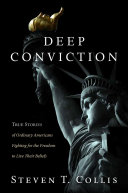2018 School Spending Survey Report
Deep Conviction: True Stories of Ordinary Americans Fighting for the Freedom To Live Their Beliefs
COPY ISBN
VERDICT Readers interested in religious liberty will find this work to be an accessible exploration of a much-disputed area of constitutional law.
RELATED
ALREADY A SUBSCRIBER? LOG IN
We are currently offering this content for free. Sign up now to activate your personal profile, where you can save articles for future viewing




Comment Policy:
Comment should not be empty !!!